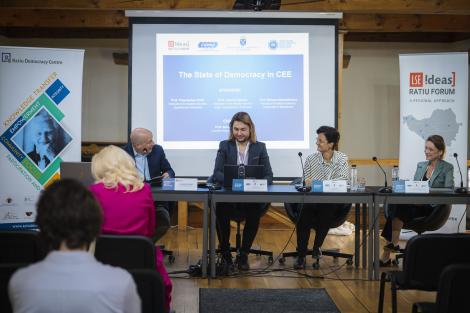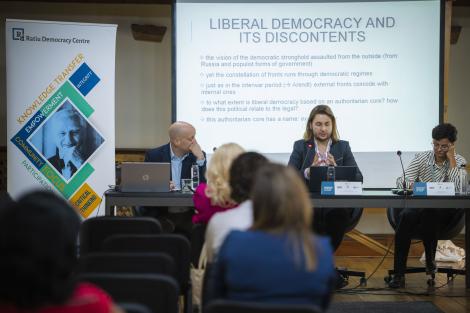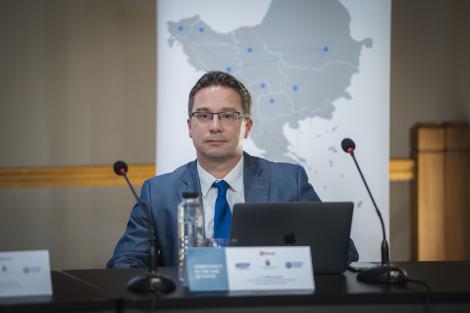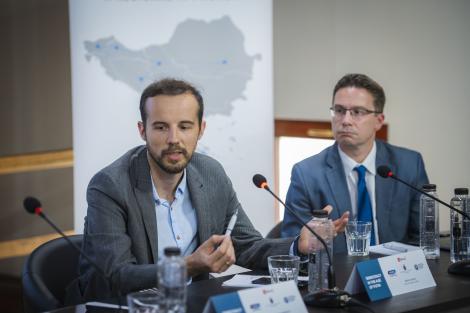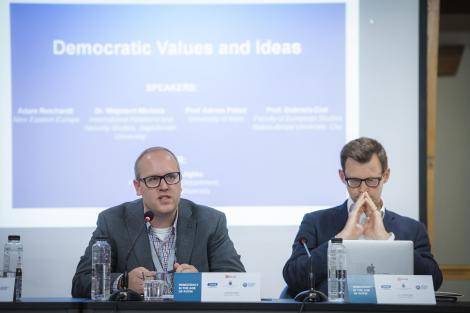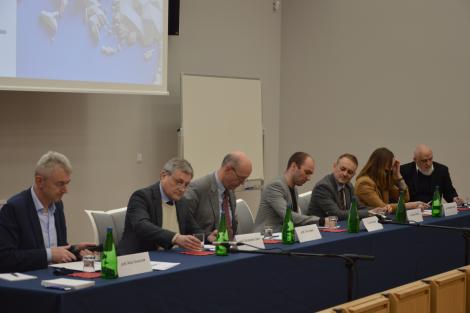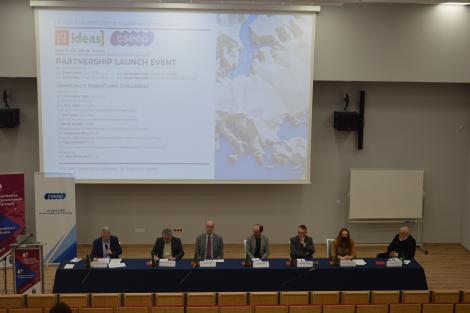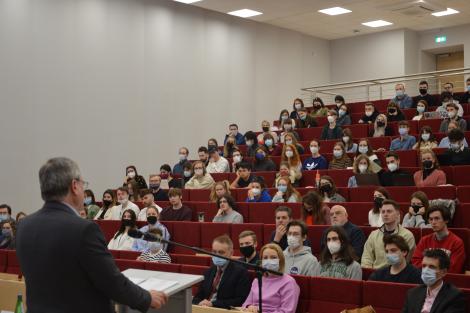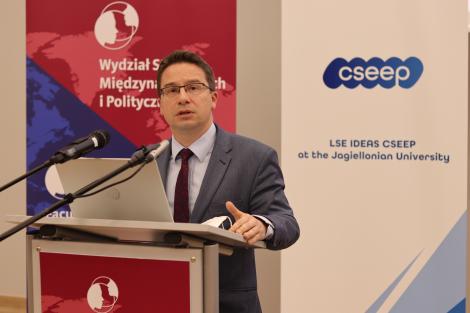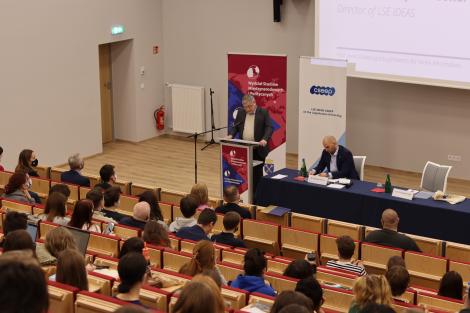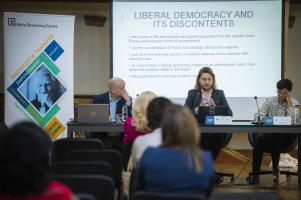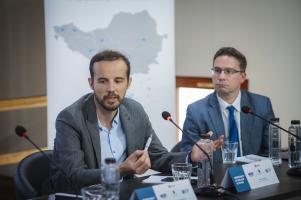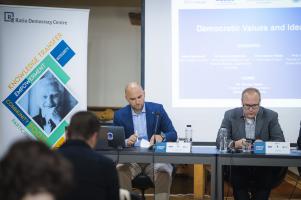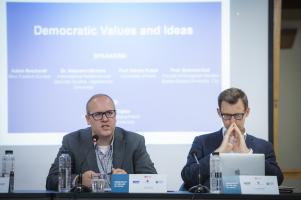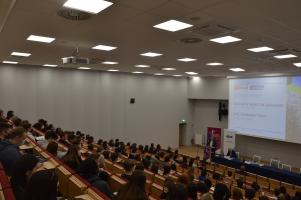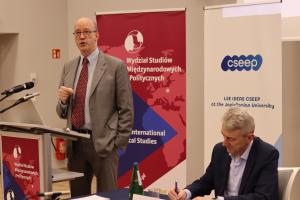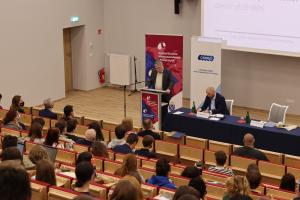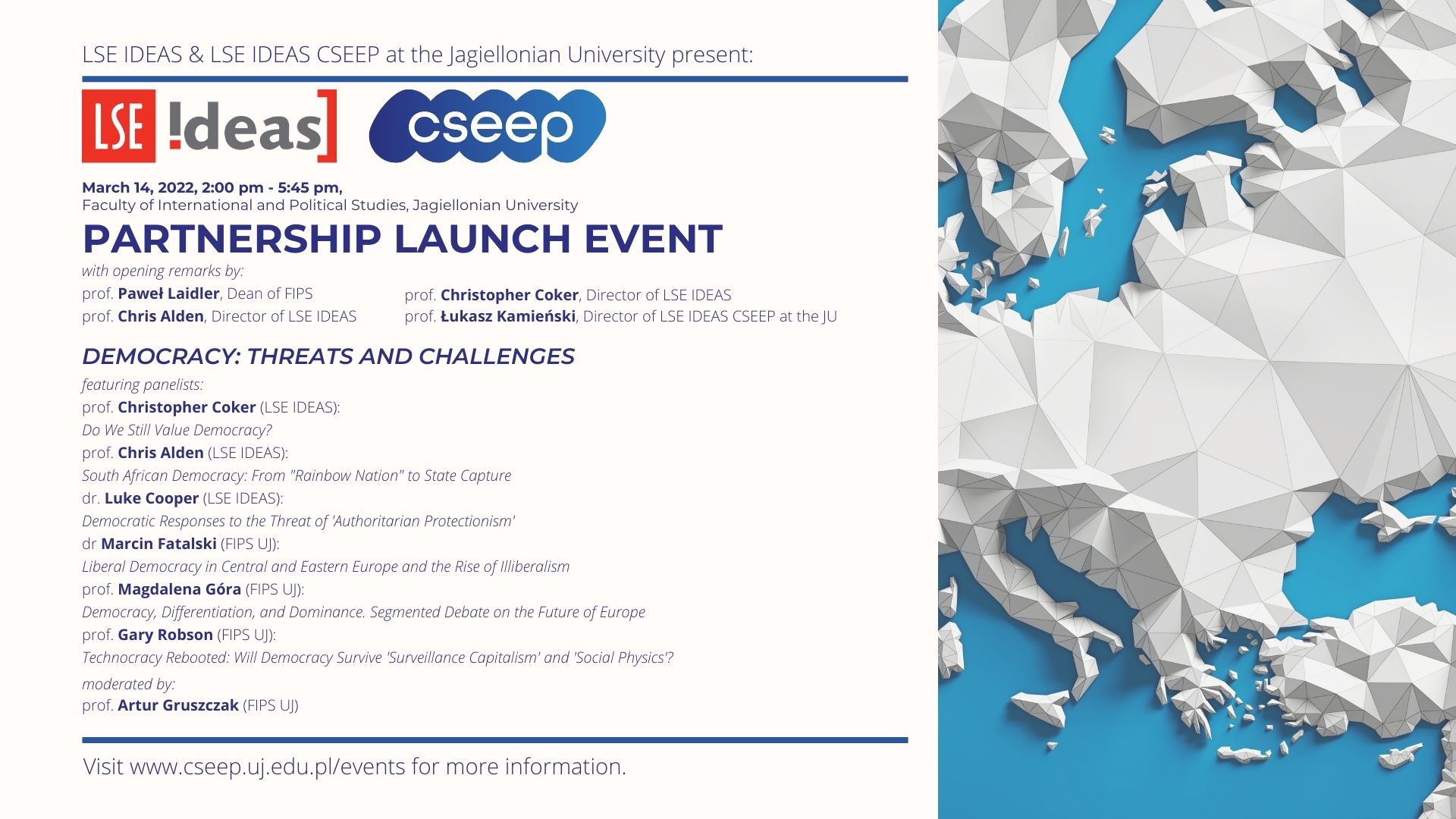 Event is set to celebrate the launched partnership between LSE IDEAS and Faculty of International and Political Studies (FIPS) and the establishment of LSE IDEAS Central and South-Eastern Europe Programme at the Jagiellonian University. The accompanying academic panel Democracy: Threats and Challenges will feature speakers from both IDEAS and FIPS discussing problems faced by liberal democracy, including value crisis, populism, illiberalism, and digital technologies.
Event is set to celebrate the launched partnership between LSE IDEAS and Faculty of International and Political Studies (FIPS) and the establishment of LSE IDEAS Central and South-Eastern Europe Programme at the Jagiellonian University. The accompanying academic panel Democracy: Threats and Challenges will feature speakers from both IDEAS and FIPS discussing problems faced by liberal democracy, including value crisis, populism, illiberalism, and digital technologies.
In November 2020, a Memorandum of Understanding Between the Faculty of International and Political Studies of the Jagiellonian University and LSE IDEAS was signed, establishing cooperation between the two institutions. The partnership aims to contribute to the global exchange of ideas and knowledge-building on the joined interest for academic research and outreach to a broader professional as well as general public.
The research cooperation focuses on topics of shared interest, such as: the future of democracy in Central and South-Eastern Europe and within the European Union, the appeal of illiberal democracy and populism, issues concerning migration, international and regional security, and energy security.
Official launch of the LSE IDEAS CSEEP at the Jagiellonian University with opening remarks by:
- prof. Paweł Laidler, Dean of FIPS
- prof. Christopher Coker, Director of LSE IDEAS
- prof. Chris Alden, Director of LSE IDEAS
- prof. Łukasz Kamieński, Director of LSE IDEAS CSEEP at the JU
Democracy: Threats and Challenges panel
- prof. Christopher Coker (LSE IDEAS director): Do We Still Value Democracy?
- prof. Chris Alden (LSE IDEAS): South African Democracy: From "Rainbow Nation" To State Capture
- dr. Luke Cooper (LSE IDEAS): Democratic Responses to the Threat of ‘Authoritarian Protectionism’
- dr. Marcin Fatalski (FIPS UJ, LSE IDEAS 2021/22 Visiting Fellow) Liberal Democracy in Central and Eastern Europe and the Rise of Illiberalism
- dr hab. Magdalena Góra (FIPS UJ): Democracy, Differentiation, and Dominance. Segmented Debate on the Future of Europe
- prof. Garry Robson (FIPS JU): Technocracy Rebooted: Will Democracy Survive ‘Surveillance Capitalism’ and ‘Social Physics’?
- Moderated by prof. Artur Gruszczak (FIPS UJ)
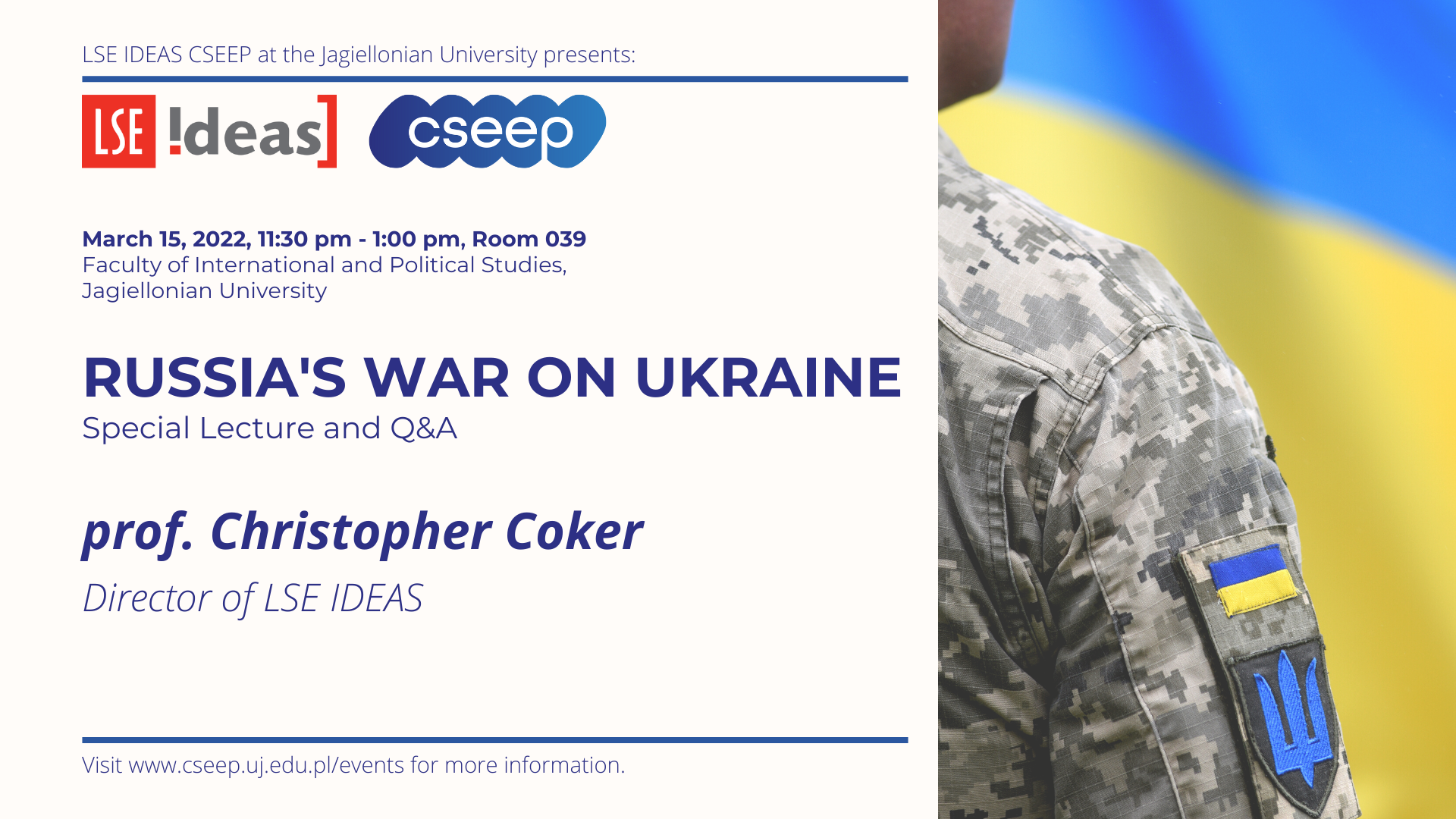
LSE IDEAS CSEEP at the Jagiellonian University is proud to invite you to a special event and Q&A session with prof. Christopher Coker, director of LSE IDEAS.
Prof. Coker will be discussing the war in Ukraine including the progress of the military campaign, the policy of the West, the impact of sanctions, the political position of Vladimir Putin and the possibility of a wider global confrontation. His remarks will be based on the discussions of IDEAS Russia-Ukraine Forum, an informal group of policy makers, academics, and journalists.
Christopher Coker is Director of LSE IDEAS, the foreign policy think tank of the LSE. He was Professor of International Relations at LSE, retiring in 2019. He is a former twice serving member of the Council of the Royal United Services Institute, a former NATO Fellow and a regular lecturer at Defence Colleges in the UK, US. Rome, Singapore, and Tokyo. He has been a Visiting Fellow at the National Institute for Defence Studies In Tokyo, the Rajaratnam School for International Studies Singapore, the Political Science Dept in Chulalongkorn University, Bangkok and the Norwegian and Swedish Defence Colleges. His publications include Rebooting Clausewitz (Hurst, 2015), Men at War: what fiction has to tell us about conflict from the Iliad to Catch 22 (Hurst, 2014); The Improbable War: China, the US and the logic of Great Power War (Hurst, 2015); Future War (Polity, 2016), and The Rise of the Civilizational State (Polity, 2019). His most recent book is Why War? (2020).
Chair: dr Wojciech Michnik (LSE IDEAS CSEEP at the Jagiellonian University)
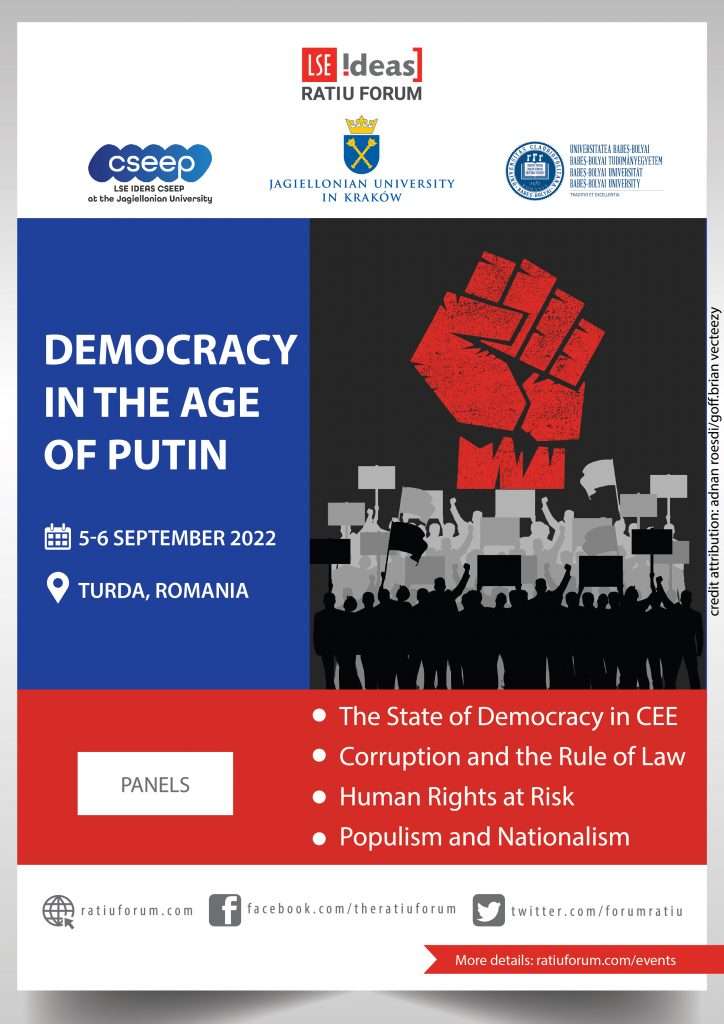 Liberal democracy was in crisis well before President Vladimir Putin’s February escalation of the Russia-Ukraine war. However, the February escalation has magnified the ongoing battle between democracy and authoritarianism. Democracy in the Age of Putin will aim to explore challenges to democratic values in the Central and Eastern European space. The conference is organised in cooperation with IDEAS (London School of Economics), the Rațiu Forum, Jagiellonian University and Babeș-Bolyai University.
Liberal democracy was in crisis well before President Vladimir Putin’s February escalation of the Russia-Ukraine war. However, the February escalation has magnified the ongoing battle between democracy and authoritarianism. Democracy in the Age of Putin will aim to explore challenges to democratic values in the Central and Eastern European space. The conference is organised in cooperation with IDEAS (London School of Economics), the Rațiu Forum, Jagiellonian University and Babeș-Bolyai University.
Taking place on September 5-6, 2022, an event was an initiative, which furthered the cooperation between all institutions and brought together experts, specialising in the CEE region. Five panels - The State of Democracy in CEE, Corruption and the Rule of Law, Democratic Values and Ideas, Human Rights at Risk, and Populism and Nationalism - gathered over 20 renowned researchers, including experts from Poland, like Joanna Dyduch, Paweł Laidler, Wojciech Michnik, Przemysław Tacik, Katarzyna Zielińska (Jagiellonian Unviersity), Adam Reichardt (New Eastern Europe), and Andrzej Sadecki (Centre for Eastern Studies).
Schedule
Monday, 5th September
10:00 - 10:05: Opening of event
10:05 - 10:15: Opening remarks: Nicolae Rațiu, Chairman of the Ratiu Family Foundation
10:15 - 12:15: The State of Democracy in CEE
- Prof. Przemysław Tacik, Institute of European Studies, Jagiellonian University
- Prof. Joanna Dyduch, Institute of the Middle and Far East, Jagiellonian University
- Prof. Raluca Alexandrescu, Faculty of Political Science, University of Bucharest
- Session Chair: Prof. Alexander Evans, London School of Economics
13:45 - 15:45: Corruption and the Rule of Law
- Prof. Elena Simina Tănăsescu, Professor at the Law Faculty, University of Bucharest
- Andrzej Sadecki, Senior Research Fellow, Centre for Eastern Studies, Warsaw
- Prof. Paweł Laidler, Dean of Faculty of International and Political Studies of the Jagiellonian University
- Session Chair: Adam Reichardt, Editor-in-Chief, New Eastern Europe
Tuesday, 6th September
10:00 - 12:00: Democratic Values and Ideas
- Adam Reichardt, New Eastern Europe
- Dr. Wojciech Michnik, International Relations and Security Studies, Jagiellonian University
- Prof. Adrian Pabst, University of Kent
- Prof. Gabriela Ciot, Faculty of European Studies, Babeș-Bolyai University, Cluj
- Session Chair: Dr. George Jiglau, Political Science Department, Babeş-Bolyai University
13:30 - 15:30: Human Rights at Risk
- Prof. Katarzyna Zielińska, Institute of Sociology at Jagiellonian University
- Prof. Christopher Coker, Director of IDEAS
- Dr. Cynthia Carmen Curt, Faculty of Political Sciences, Babeș-Bolyai University, Cluj – TBC
- Dr. Laura Herța, Faculty of European Studies, Babeș-Bolyai University, Cluj
- Session Chair: Prof. Przemysław Tacik, Institute of European Studies, Jagiellonian University
16:00 - 18:00: Populism and Nationalism
- Prof. Sergiu Mișcoiu, Faculty of European Studies, Babeș-Bolyai University, Cluj
- Dr. Fernando Herrero, University of Manchester, Centre for Translation and Intercultural Studies
- Prof. Slobodan Markovich, Professor at the School of Political Science of the University of Belgrade
- Session Chair: Prof. Christopher Coker, Co-Director, LSE IDEAS
For more information about speakers, visit the official website of the event.
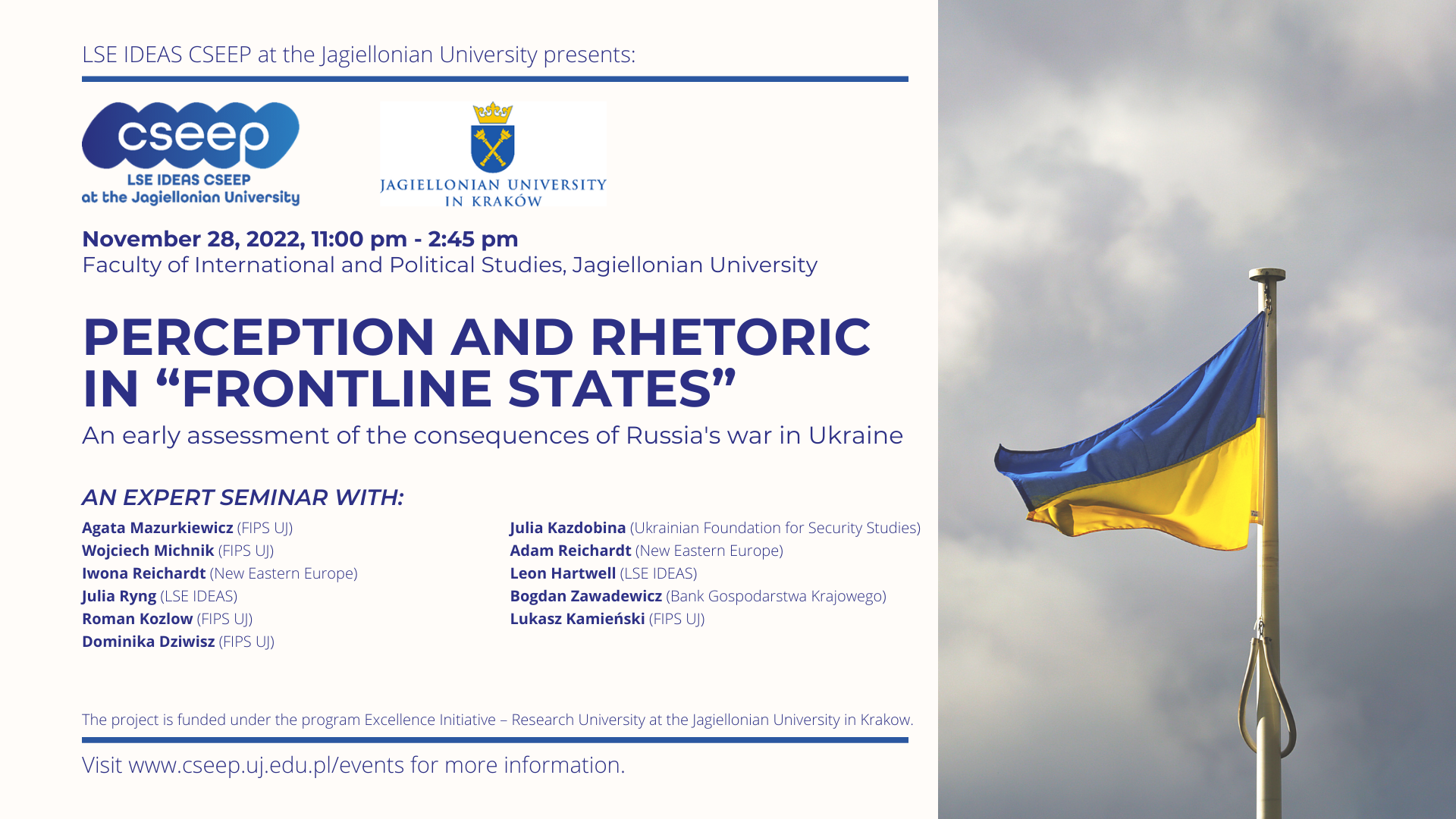
The Russian Federation’s full-scale invasion of Ukraine on 24 February 2022 and the subsequent war have already had a dramatic effect on multiple fields, from international order, through regional economy, to individual lives. The aggression is being widely analyzed by politicians, journalists, academics, and citizens around the world, yet it gains particular importance in NATO’s “frontline states”, including Poland, Romania, and the Baltic states. These countries share a complicated historical relationship with Russia and a particular geopolitical position on the Eastern flank of NATO and the EU. Hence, the perceptions and rhetoric surrounding the conflict and its consequences visible in these frontline states have become significant in shaping international and national policies and security. While the Russian war against Ukraine is still ongoing, it is vital to identify, assess and discuss the main strands and tropes of the political and security discourse surrounding the war and its consequences.
The overall aim of this project is to bring together Polish and international academic and think-tank community to share their early assessment of the consequences of Russia’s war in Ukraine with the public and prepare the initial pillars for a more substantial cooperation between scholars from FIPS (Faculty of International and Political Studies at JU) and the external environment of the university based on the FIPS’ expert platform of LSE IDEAS CSEEP at the Jagiellonian University. By inviting scholars and practitioners to participate in a joint expert seminar, this project attempts to popularize the interdisciplinary effects of research that are key to understanding a complex security situation in the region of Central and Eastern Europe (CEE).
Expert seminar, 28.11.2022
A one-day meeting will present the research results to the public and engage the audience in the discussion. Its aim is to get wide outreach both in Krakow, Poland and internationally.
Participants:
- Agata Mazurkiewicz, Wojciech Michnik, LSE IDEAS CSEEP at Jagiellonian University
- From concept to reality? Poland as a “frontline state” and its early responses to the war
- Iwona Reichardt, New Eastern Europe
- Poland’s assistance to Ukraine: causes and prospects
- Julia Ryng, LSE IDEAS
- Growing social and cultural tensions in frontline states
- Roman Kozlow, Jagiellonian University
- Ukrainian narrative after February 24, 2022
- Dominika Dziwisz, Jagiellonian University
- The cyber dimensions of the Russia’s war in Ukraine
- Julia Kazdobina, Head at Ukrainian Foundation for Security Studies
- Russian propaganda/influence and approaches to countering it by communication and regulation
- Adam Reichardt, Editor-in-Chief, New Eastern Europe
- Upcoming challenges in Transatlantic Relations and support for Ukraine
- Leon Hartwell, CSEEP LSE IDEAS
- The Baltics and the Russia-Ukraine war: impacts, contributions, and the way forward
- Bogdan Zawadewicz, Bank Gospodarstwa Krajowego
- The impact of ongoing war in Ukraine on the Three Seas Initiative (TSI): main challenges and opportunities
- Lukasz Kamieński, the director of the LSE IDEAS CSEEP at Jagiellonian University, will serve as a chair of the seminar.
The seminar will take place in the building of the Faculty of International and Political Studies of Jagiellonian University, at Reymonta 4, Krakow in room 09 (ground floor).
Program:
- 10:30-10:55 Arrival of participants
- 11:00-11:10 Welcome and introductory remarks
- 11:10-12:45 Panelists’ presentations
- 12:45-13:10 Break
- 13:10-14:40 Q&A and discussion
- 14:40-14:45 Concluding remarks
The project is funded under the program Excellence Initiative – Research University at the Jagiellonian University in Krakow.
 The lecture put forward the argument that ‘new wars’ represent a long-term social condition characterised by violent political and economic fragmentation. The Putin regime exhibits many of the characteristics to be found in regimes where new wars take place; indeed Putin has been fighting new wars ever since he came to power. The lecture asked whether Putin’s aim is turning Ukraine into a ‘new war’ – winning may not mean military victory but long-term chaos.
The lecture put forward the argument that ‘new wars’ represent a long-term social condition characterised by violent political and economic fragmentation. The Putin regime exhibits many of the characteristics to be found in regimes where new wars take place; indeed Putin has been fighting new wars ever since he came to power. The lecture asked whether Putin’s aim is turning Ukraine into a ‘new war’ – winning may not mean military victory but long-term chaos.
Mary Kaldor is Professor Emeritus of Global Governance and Director of the Conflict Research Programme at the London School of Economics and Political Science. She has pioneered the concepts of new wars and global civil society. Her elaboration of the real-world implementation of human security has directly influenced European and national governments. She is the author of many books and articles including New and Old Wars: Organised Violence in a Global Era (3rd edition, 2012), International Law and New Wars (with Christine Chinkin, 2017) and Global Security Cultures (2018).
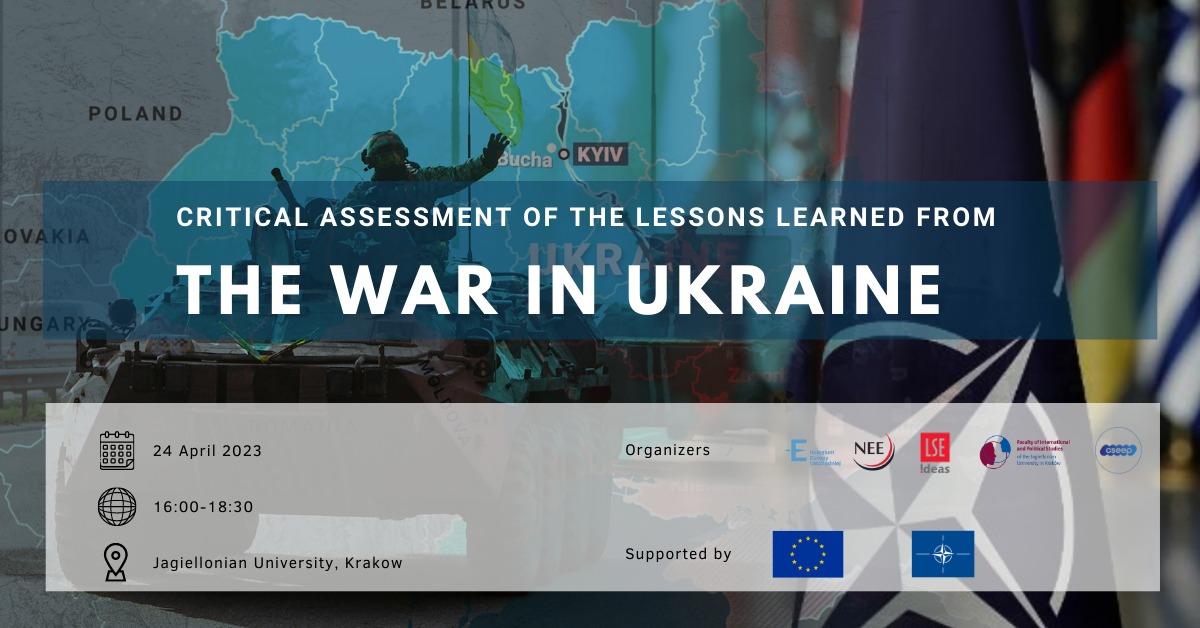 We invite you to join us for a critical assessment of the lessons learned from the war in Ukraine, organized with New Eastern Europe. This project will provide a platform for discussions and recommendations before the NATO Vilnius Summit.
We invite you to join us for a critical assessment of the lessons learned from the war in Ukraine, organized with New Eastern Europe. This project will provide a platform for discussions and recommendations before the NATO Vilnius Summit.
As the world continues to face complex security challenges, it is crucial to reflect on the lessons learned from past conflicts and find ways to prevent future ones. We aim to understand the key lessons from the war in Ukraine on the topics of strategic cooperation and strategic communication.
During this event, we will bring together experts and scholars to share their insights and perspectives on the war in Ukraine. We will discuss the challenges and successes of the international community's response to the conflict, and the discussions will focus on the role of NATO and its member countries in the conflict.
This event is open to all who are interested in understanding the complexities of the conflict in Ukraine and contributing to a constructive dialogue on the way forward. We look forward to your participation and insights.
Speakers:
• Dominik P. Jankowski, Policy Adviser to the NATO Secretary General
• Mariia Zolkina, David Davies of Llandinam Research Fellow, LSE, Ukraine/United Kingdom
• Stefano Braghiroli, University of Tartu, Estonia
• Alexander Lanoszka, University of Waterloo, Canada
The event will take place at the Faculty of International and Political Studies of the Jagiellonian University, Reymonta 4, Kraków. Room 37
The event was co-funded by NATO and the European Commission.
A video from the event can be found here.


